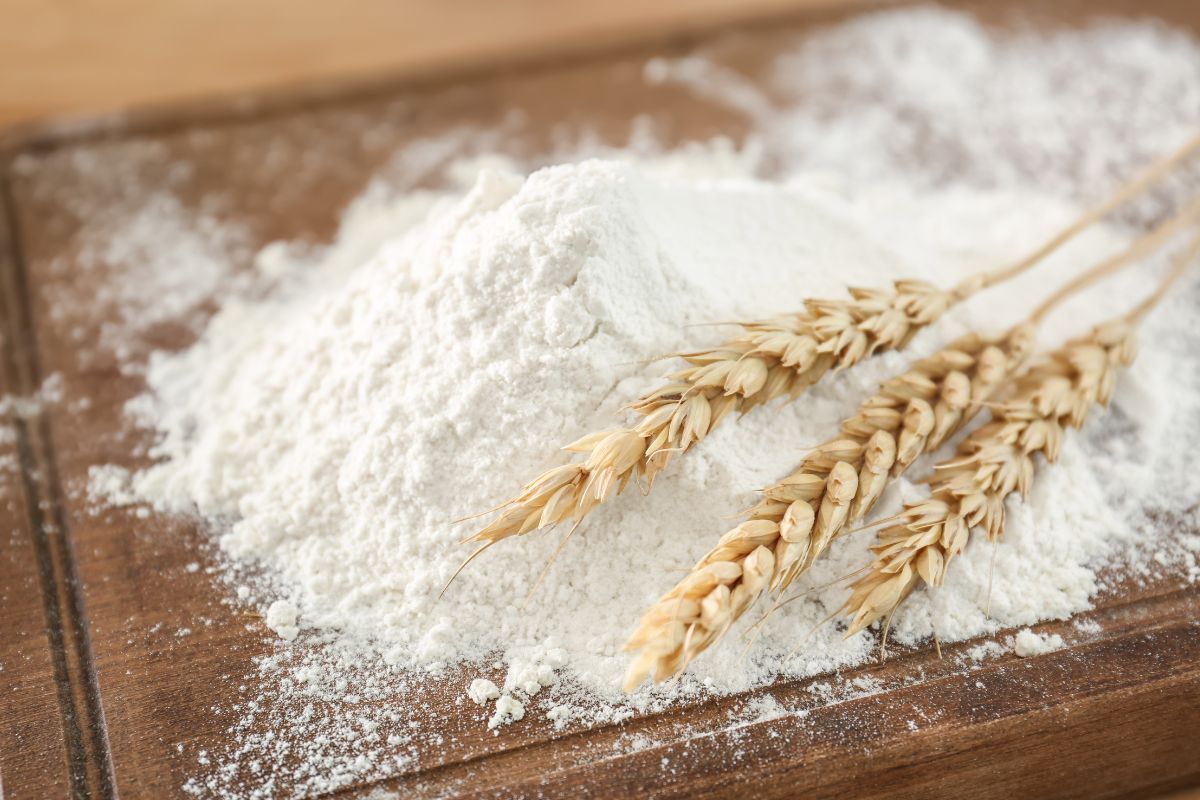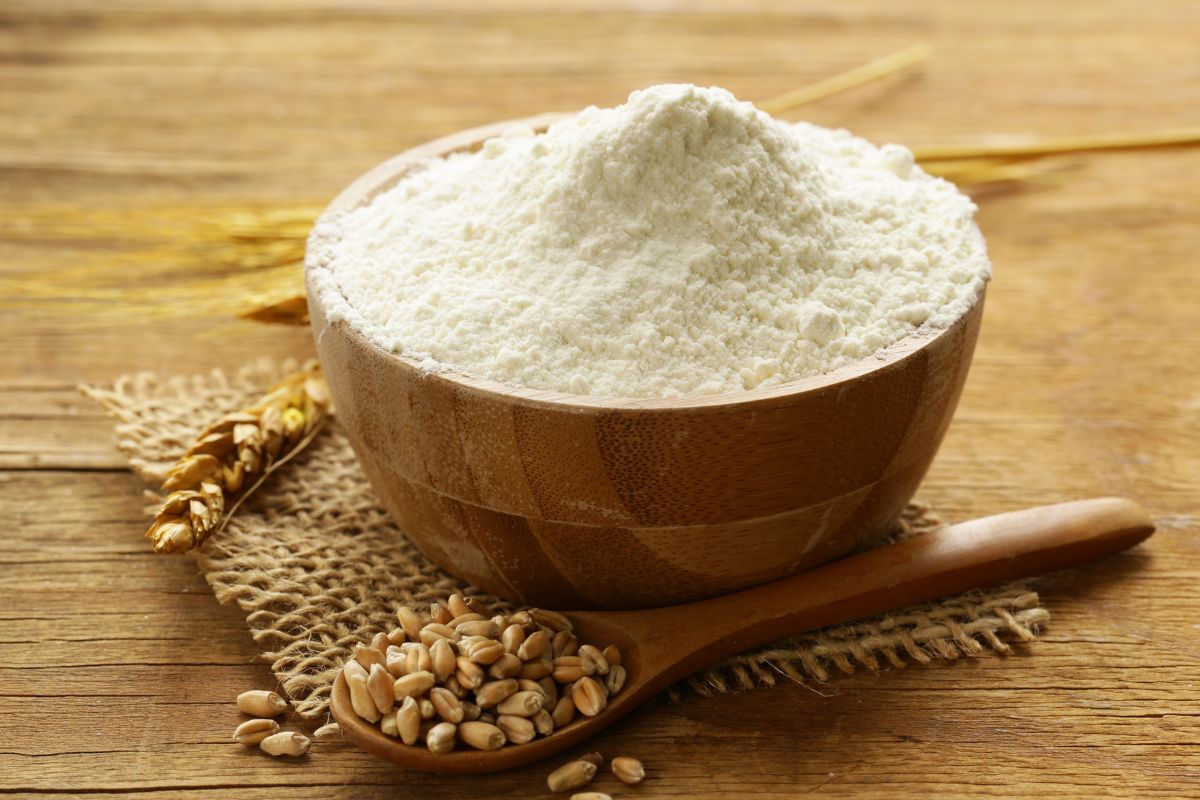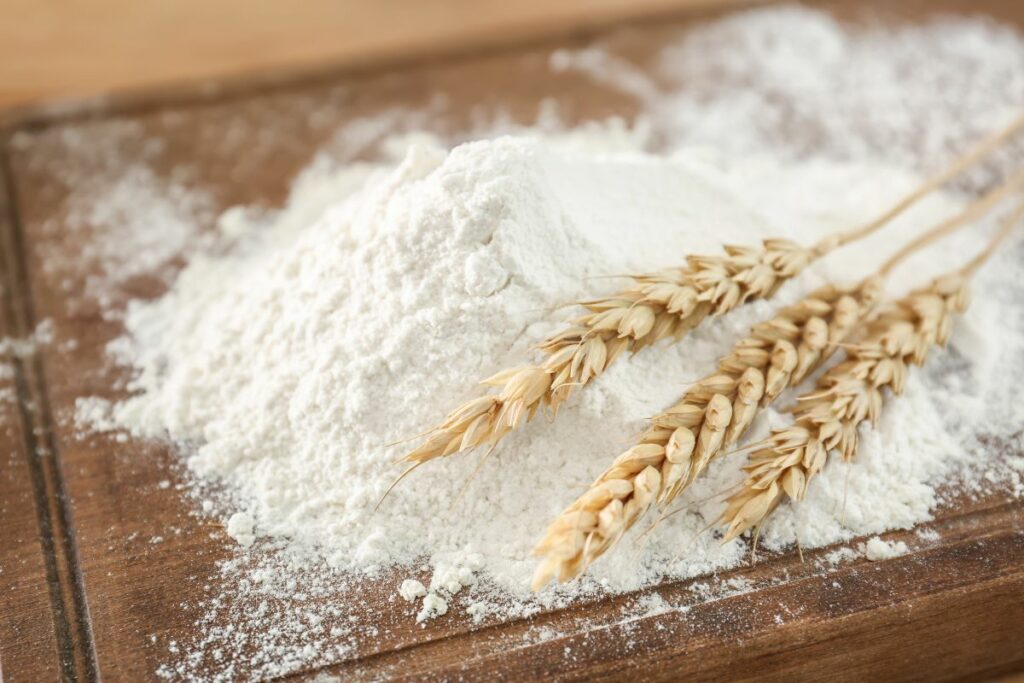Most people tend to believe that white flour isn’t as healthy as whole wheat flour, but is this true? What makes these two forms of flour different is the way that they are processed.

Wheat flour typically goes through little extra processing, but the same cannot be said for its white counterpart.
White flour is processed in a way that removes its nutrients. This is why flour millers sometimes add extra nutrients to the flour after it’s been processed.
This might make white flour a little healthier, but these nutrients aren’t natural, and aren’t in the same quantities that you’ll notice within whole wheat flour.
We’ll cover more about whether whole wheat flour is or isn’t healthy in this article, including if it’s easy to digest, as well as if it can help you lose weight.
Keep reading to learn more about whole wheat flour!
Whole Wheat Flour Nutritional Content
The nutritional content of whole wheat flour will depend on the brand, but 100 grams of whole wheat flour tends to contain around 343 calories.
It also contains 75 grams of carbohydrates, 12 grams of protein, and 0.01 milligrams of Vitamin B12.
Mineral-wise, 100 grams of whole wheat flour also contains 2730 IU Vitamin A, 0.36 grams of calcium, and 0.2 milligrams of iron.
Whole wheat flour also has a tiny amount of sodium. There’s 0.01mg per 100 grams, which is less than 0.04 milligrams found in white flour.
Fiber
Fiber is important for good well-being as it keeps the digestive system in optimum condition. 100 grams of whole wheat flour contains 12 grams of fiber. This is much more compared to white flour, which only has 0.75 grams of fiber for the same amount.
Whole wheat flour contains the amount of fiber within wheat, but in white flour, fiber will have been taken out in the processing stage. Eating enough fiber can help manage blood sugar and prevent heart disease, so switching to whole wheat flour could make a positive difference to your well-being.
Both forms of flour have few other nutrients, but thanks to its fiber content, whole wheat flour is much more nutritious compared to white. Whole wheat flour also contains niacin, thiamin, and vitamin B-12.
Unfortunately, white flour doesn’t have any one of these nutrients.
Additives
Whole wheat flour doesn’t contain any additives. The whole grain is ground down and then sifted, leaving the endosperm and flour behind.
As there are no additives, you can trust that whole wheat flour is also free from preservatives and artificial sweeteners.
On the other hand, white flour usually contains additives, including bleaching that makes it appear whiter than it is. If you’re looking for a healthier substitute for white flour, whole wheat flour can be a great choice!
Does Whole Wheat Flour Help In Losing Weight?
Several people switch to whole wheat flour when losing weight, as they believe it has more health benefits.
Whole wheat flour is a little lower in calories compared to white flour, and as noted above, has more fiber too.
However, the calorie difference between the two isn’t that different. While 100 grams of white flour contains around 364 calories, the same amount of whole wheat flour contains around 343 calories.

This is a difference of just 21 calories, so switching to whole wheat flour won’t make a huge difference in terms of your energy intake.
However, as there is more fiber within whole wheat flour, it can help keep you fuller for a greater period.
Research has shown that those whose diets were higher in fiber lost more abdominal fat than those on lower fiber plans.
As you need to consume less food to lose weight, choosing foods that can keep you satiated will help in the process.
It’s also important to choose nutritious foods to ensure you’re getting enough nutrients. Whole wheat flour is full of vitamins and minerals, including vitamin B12, iron, and calcium.
Furthermore, whole wheat flour is a complex carbohydrate. The body takes longer to break down and digest these compared to simple carbohydrates.
As they aren’t broken down as quickly, they won’t raise your blood sugar as quickly, leading to fewer cravings and hunger pangs as you go about your day.
Considering there isn’t a huge calorie difference between each type of flour, choosing nutrient-dense flour will be better for your well-being than flour full of additives.
Does Whole Wheat Flour Digest Easily?
Whole wheat flour digests better than white flour. White flour is milled to remove the germ and the bran. These parts of the grain contain nutrients that dietary fiber which make digestion easier.
The extra fiber in whole wheat flour is also important for the digestive system.
It helps to avoid constipation by regulating bowel movements. Fiber also supports the good bacteria within your intestines, helping you maintain a healthy gut.
Using Whole Wheat Flour To Cook
We’ve seen how whole wheat flour is healthier than white, but you don’t need to give up your favorite foods to make the switch!
While substituting white flour for whole wheat is the better choice, you can use a blend of both types to bake with. For instance, baked treats tend to taste better with white flour.
Instead of using 100% whole wheat, use half white flour and half whole wheat to bake cakes, cookies, or muffins.
Some foods taste amazing with whole wheat flour, like pasta and bread, so feel free to completely swap white for whole with these foods.
If you’re not so keen on the taste, adding a strong sauce can help make the food taste better. Pesto and cherry tomatoes are examples of foods that pair well with whole wheat foods.
Final Thoughts
Whole wheat flour is superior to white flour in many ways! Whole wheat flour contains no additives, has slightly fewer calories, and contains more nutrients.
As it’s full of fiber, it can keep you feeling fuller for a longer period. This is great for those that are looking to lose weight.
Remember that even though whole wheat flour is better for you, you don’t need to stop eating your favorite treats! Try baking with a blend of both flours, or adding extra vegetables and sauces to your whole wheat recipes.
Swapping whole wheat flour for white is a simple move that can do wonders for your health, so consider making the switch today!








